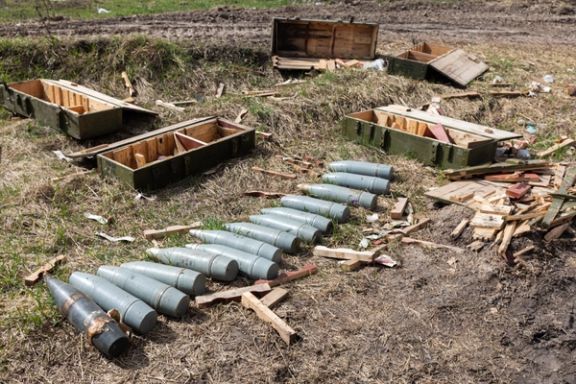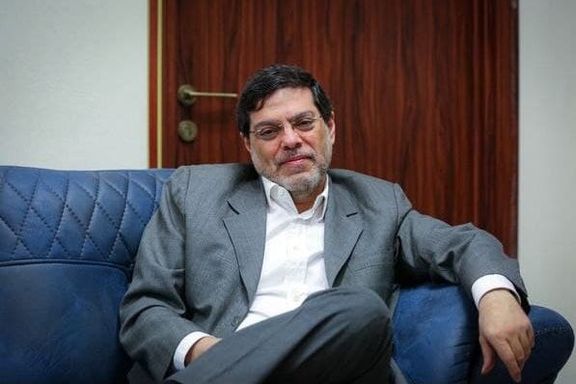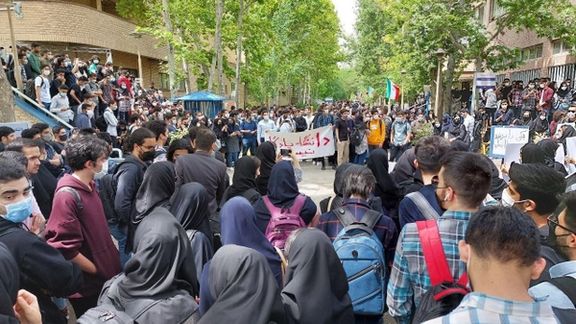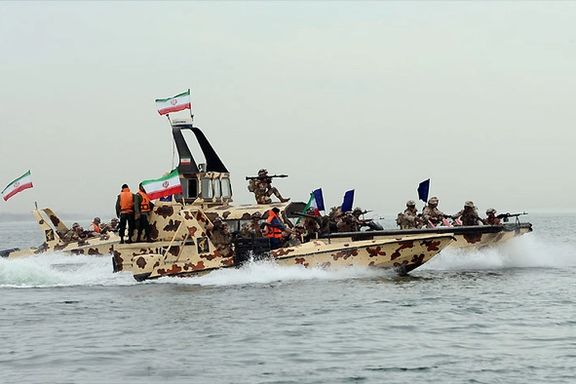Russia Denies Iranian Networks Delivering Arms For Its War In Ukraine

The Russian embassy in Tehran has denied that Iranian networks help smuggle munitions and military hardware sourced from Iraq to Russia for the war in Ukraine.

The Russian embassy in Tehran has denied that Iranian networks help smuggle munitions and military hardware sourced from Iraq to Russia for the war in Ukraine.
The Guardian had quoted Iranian-backed Iraqi militias and regional intelligence services on April 12 as saying that undercover networks were used in the past month to supply rocket-propelled grenades (RPGs), anti-tank missiles and Brazilian-designed rocket launcher systems to Russia.
The embassy rejected the report about 12 days later probably because reports have emerged saying that flights by Iranian military-affiliated planes to and from Russia have increased since the beginning of the Russian invasion of Ukraine on February 24.
The Iranian embassy in London also dismissed the Guardian article as “baseless storytelling”.
A source who helped organize the transport said the Iranian authorities had also donated an Iranian-made Bavar 373 missile system, similar to Russia’s S-300, to Moscow. Tehran also returned an S-300 to Russia, the source said.
Earlier in April, The Telegraph reported that Russia was running out of some weapons because critical parts were made in Ukraine, including Kh-55 nuclear capable cruise missiles that are also used by Iran and China.

A leopard was shot dead in the northern Iranian city of Ghaemshahr in Iran on Sunday after attacking and injuring a policeman.
The endangered big cat "was killed by two bullets to save the life of the police officer”, creating uproar among the Iranian social media users.
A video circulating on social media shows the panicked leopard standing on the front side of an apartment building above a bank.
The director general of Mazandaran province Environment Protection Organization, Attaullah Kavian, said in a video message on Sunday that the leopard was about five years old and was seen in the city in the morning and then took refuge in a garden house.
He added that despite numerous warnings, a large number of people gathered in front of the house, which panicked the leopard, and made it attack the police officers who had entered the premises.
The officers fired at the animal before the Environment Organization shot it with tranquillizer darts.
It was transferred to a wildlife center nearby, but the vets didn’t manage to save the leopard.
Officials said it was not yet clear how and why the leopard entered the city, but a report by Fars News Agency said it belonged to a citizen.
Since 2016, Panthera pardus tulliana -- which is a leopard subspecies native to the Iranian Plateau and surrounding areas -- has been listed as endangered, as the wild population is estimated to be less than 1,000 mature individuals, with most of them living in Iran.

A member of the Iranian delegation to the nuclear talks says the Ukraine war will eventually force Washington to agree to Tehran's demands and make a deal.
"Failure to reach a deal [so far] is a result of domestic troubles in the US but the ever-increasing problems caused by the Ukraine war will put pressure on [President Joe] Biden to accept the necessity of a deal [with Tehran]," Mohammad Marandi, the US-born media advisor of the Iranian delegation to the Vienna nuclear talks told the official news agency IRNA on Sunday.
Marandi claimed that none of the other parties in the talks -- the three European sides, Russia, China and Tehran -- have any problem with continuing the talks. "It has to be seen what decision Biden will make about continuing [the negotiations]," he said.
Marandi who is often interviewed as a commentator on Iran's foreign relations by the state media told IRNA that Americans admit Iran has scored 'considerable gains' in the talks. "That's why some of the members of the US delegation resigned and left the teas in protest," he said referring to the resignation of Richard Nephew, the architect of Washington's sanctions on Iran in January, and part-time senior adviser Dan Shapiro in March.
"Talks were progressing fast during the last few days but the Americans abruptly put a break to them over various issues including the lifting of sanctions and its verification, guarantees, as well as [delisting of the] IRGC," Marandi said.
Tehran insists that the designation of the IRGC as a terrorist organization was part of the Trump administration's 'maximum pressure' campaign against Iran and therefore should be reversed, but the US considers the designation unrelated to the nuclear issue.
Iranian officials reiterate that it is Washington's "excessive demands" that has prevented a deal from materializing and that Tehran will not surrender to such demands.
What the US state department has said is that if Iran wishes to discuss sanction unrelated to the nuclear issue, it should accept to widen the talks to include other outstanding problems.
Pundits now consider a deal to restore the 2015 deal, Joint Comprehensive Plan of Action (JCPOA), much less likely than in mid-March when it appeared to be only a few days away, as Tehran and Washington both insist on their positions and throwing the onus on each other.
"Chances of a deal and the restoration of the JCPOA are less than a few months ago. For any progress either the US or the Iranian side must make a compromise. It's quite possible that failing to do so could prevent a deal from being made," Karl Kaltenhaler, director of the Center for Intelligence and Security Studies at The University of Akron in Ohio told the Iranian Labour News Agency (ILNA) Thursday.
In an interview with London-based The New Arab newspaper published Friday, the US ambassador to the UN Linda Thomas-Greenfield said there was a possibility that there will not be an agreement over the restoration of the JCPOA and mutual compliance. "We're ready and they're not," she said.
She also reiterated that the Biden administration would work to ensure that Iran is never allowed to acquire nuclear weapons, suggesting that the US will use its vote, if the matter is referred to the UN Security Council, to put the brakes on Iran's nuclear program.

A large group of students held a demonstration at their Tehran university against tightened measures by morality guards to force students to comply with hijab.
Students of the University of Science and Technology held a gathering and a march at their campus to protest the atmosphere of fear, intimidation and interference of morality guards to force them to comply with Islamic dress and other codes.
The rally took place four days after a member of the Islamic Association of the university was beaten while distributing a statement against the newly enforced measures by morality guards and and supervisors at the women’s dormitories.
The students chanted slogans against the measures and the morality guards and university authorities such as "Girls' dormitory is a prison cell" and "We do not want police-style guards".
Iran international reported on Friday that some universities in the capital Tehran have tightened dress code restrictions as the students have started to attend in person after over two years of virtual classes due to the Covid-19 pandemic.
In an unprecedented move, morality guards of the University of Science and Technology and Amirkabir University began motorcycle patrols to force students comply with hijab and other Islamic regulations.
Other guards who are stationed at the gates of the university and its dormitories have also been unprecedently strict since universities reopened, students said, denying access to those whose appearance is not deemed "appropriate".
The university security is also tasked with watching over the social and political behavior of students and the new motorcycle patrols started to check if the students are always observing the hijab rules, and if male and female students sit and mingle together on the campus. If they saw anyone who didn’t comply with the regulations, they wrote down their student numbers, which means they could face more severe consequences if they repeat such behavior.
Similar measures have also been reported in other universities of the capital Tehran, with some students describing the unprecedented restrictions as similar to those imposed by the Taliban.
On Wednesday, students at the Iran University of Science and Technology wrote an open letter in protest to the new restrictions, saying “University is not a barracks, and the dormitory is not a prison”.
The Islamic Students Associations of the University of Tehran and Tehran University of Medical Science also wrote to the president of their universities in the past few days to criticize the new measures.
Students say after the re-opening of higher education institutions this year, the atmosphere has greatly changed. Authorities appointed after hardline President Ebrahim Raisi was elected, they say, are apparently finding it a good time to enforce an aggressive approach to Islamic discipline on students.
Since hijab became compulsory in Iran, within a couple of years from the Islamic Revolution of 1979, all government offices and universities have had special officers monitoring women's abidance by the rules of compulsory hijab and preventing those failing to meet their standards of modesty from entering the premises.

A Syrian war monitor says Hezbollah established weapons workshops near the western city of Homs under the supervision of the Iran's Revolutionary Guard (IRGC).
According to a report by the Syrian Observatory of Human Rights (SOHR) on Saturday, the Iran-backed Lebanese group is manufacturing various kinds of mines, artillery shells, and missile in the workshops in the strategic Mahin area in the southeastern countryside of Homs.
The observatory added that many people from the town of Mahin are now working in the ranks of the local militias loyal to Iran, which helped the Syrian government forces take control of the area in early 2017, with Russian air support.
The SOHR cited its sources as saying that after Russian forces completely withdrew from Palmyra Air Base on the eastern outskirts of Homs and relocated to Tiyas Military Airbase, also known as the T-4 Air base, Palmyra Air Base came under the control of Hezbollah and the Afghan Fatemiyoun militia recruited and maintained by the Islamic Republic.
Early in 2022, the observatory reported that IRGC and Hezbollah had started construction work to expand two old military bases near the capital Damascus, saying they are turning the compounds into training and operations centers with underground facilities to store drones and weapons.
Iran International has learned that Israel is considering the possibility of a direct conflict with the IRGC in Syria and its proxies in Lebanon while Iran is settling Shiites in large tracts of land close to the Syrian Israeli border it bought in recent years.

Iran's Revolutionary Guards (IRGC) have seized a foreign vessel in the Persian Gulf for smuggling 200,000 liters of fuel, a senior Guards commander said Sunday.
"The ship was seized in the northern part of the Persian Gulf. Its eight crew have been handed over to legal authorities in the southern port city of Bushehr," Gholamhossein Hosseini told Fars news agency affiliated with the IRGC, without elaborating on the nationalities of the crew members.
The IRGC has announced several similar fuel seizures this month, but they have not provided information about the port of origin or the destination of the cargoes. The powerful Guards control most of Iran’s ports through their military and intelligence presence.
It is not clear why seizures or claims of seizures have increased in recent weeks.
Iran, which has some of the world's cheapest fuel prices due to heavy subsidies and the plunge in value of its national currency, has been fighting small-scale fuel smuggling by land to neighboring countries and by sea to Persian Gulf Arab states.
The volumes seized from ships are relatively small in comparison to average oil tanker capacity. The vessels are usually small vessels conducting local trade in the Persian Gulf.